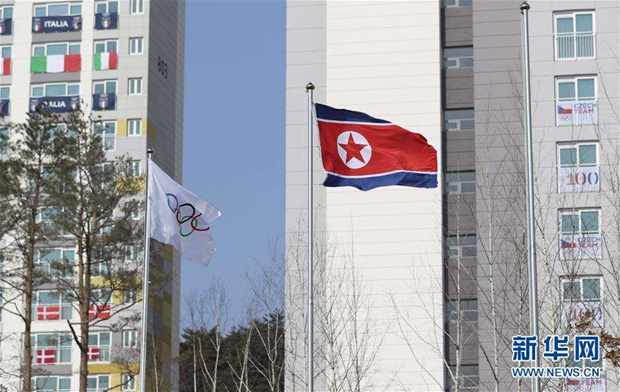Olympics mark window of opportunity for Korean nuclear issue
- By Wang Fudong
 0 Comment(s)
0 Comment(s) Print
Print E-mail China.org.cn, February 9, 2018
E-mail China.org.cn, February 9, 2018

The Flag of International Olympic Committee [L] and the National Flag of North Korea [Photo/Xinhua]
Pyongyang announced on Feb. 4 that it will send a high-level delegation, led by Kim Yong-nam, the nominal head of state of the People's Democratic Republic of Korea, to be present at Friday's opening ceremony for the Winter Olympics held in Pyeongchang, South Korea.
President of the Presidium of the Supreme People's Assembly of North Korea, the 90-year-old Kim has been within the top echelon of state leaders of the DPRK since the 1950s. His planned presence in Pyeongchang shows Pyongyang attaching importance to the event, as well as its good will.
To have Kim, who also made appearances at the Beijing Olympic Games in 2008 and the Sochi Winter Olympics in 2014, beside him in Peyongchang, South Korean President Moon Jae-in would have enough reason to take a pride in his administration's diplomatic breakthroughs. On the part of the North, making a favorable impression on people living in the South can marginalize the anti-DPRK powers in the ROK.
The Winter Olympics also provide the North with a platform to engage in multilateral diplomacy. Pyongyang faces its harshest diplomatic isolation and economic sanctions in recent years under mounting pressure from the United States. Sending the man second only to top leader Kim Jong-un to Peyongchang is conducive to the DPRK having contact and dialogue with senior leaders from other countries participating in the event.
It is reported that leaders from 16 countries and international organizations will be present at the opening ceremony, including U.N. Secretary General Antonio Guterres, U.S. Vice President Mike Pence, Japanese Prime Minister Shinzo Abe and Chinese Politburo member Han Zheng.
Although some think Kim is only a symbolic figure, he has rich experience in diplomacy and rare influence on the politics of the DPRK that few can match.
Apart from his meeting with Moon, the potential face-to-face encounters with U.S. and European leaders are the most anticipated of Kim's trip, which provide Pyongyang with an opportunity to relieve its diplomatic and economic pressure.
At a critical moment of the Korean nuclear issue, Pyongyang cherishes this opportunity of Olympic diplomacy to realize its diplomatic purposes. No wonder some conservatives in the South worry that the Pyeongchang Winter Olympics may possibly be transformed into the "Pyongyang Winter Olympics."
To some extent, the Pyeongchang Winter Olympics have already been bestowed with a deeper meaning beyond sports. That almost all relevant parties, except Russia, will send leaders to Pyeongchang justifies the expectation that the situation on the Korean Peninsula might take a sharp turn in a positive direction.
Despite this, past experience has given political and academic circles enough reason to be cautious about future developments in the Korean situation, toning down their expectations for the possible meetings between the DPRK and the West.
Previously, Pyongyang has more than once resorted to stalling tactics by using meetings and dialogues as buffer periods to prepare for further nuclear tests, which all relevant parties know well now so they will not retake the old path. They have never before reached such a unanimous consensus on the principle of denuclearization of the peninsula as they have now.
Unless the DPRK makes concrete declarations on its denuclearization, it will be very difficult for it to improve ties with the other countries. The Donald Trump administration's DPRK policy is undoubtedly clear that denuclearization is the premise for any dialogue. If not, the U.S. will continue to mount pressure, and even the possibility of military attack is not excluded.
Whether the DPRK will compromise depends on whether its economy can endure the economic sanctions that have already approached an extreme. Predictions are divided: Some believe the North's economy can endure for a long period of time, while others think the country's economy will soon collapse.
One sure thing is that, with the intensifying of the sanctions, Pyongyang's ability drifts farther and farther from the requirements of realizing its strategic objectives.
The DPRK wants to be a nuclear country. But it does not yet have the ability to realize that objective. Its backward industrial and agricultural productivity, as well as its energy and economic structures, lack the lasting ability to withstand pressure. When its endurance draws close to its breaking point , it will be possible for Pyongyang to make concessions to some extent.
Since the true circumstances in the DPRK are not completely known and given the unexpectedness and flexibilities of its previous strategic swerves, with Kim Jong-un's new year speech as the latest telling example, it is difficult to predict what diplomatic fruits will be achieved in Pyeongchang, and whether the Winter Olympics will mark a turning point leading to the mitigation of the Korean situation.
In brief, the Olympic games create a rare chance for the leaders of relevant countries to meet each other, presenting a window of opportunity to ease the tensions on the peninsula.
As the developments of the Korean nuclear crisis have disappointed the Korean people time and time again after a previous period of hope, we can only hold measured expectations for the possible Pyeongchang meetings.
The author is an assistant researcher of Korean Peninsula studies with the China Institutes of Contemporary International Relations.
This post was first published in Chinese and translated by Li Yang.






Go to Forum >>0 Comment(s)